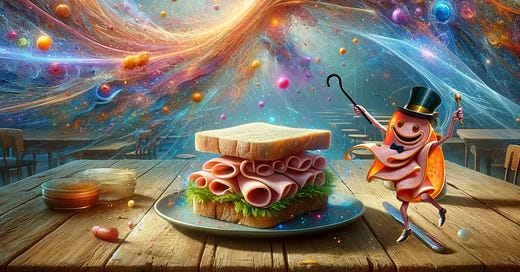I was recently privy to a conversation where someone who has been in the Gurdjieff work for many years and has professional skills in neurology maintained that we can never actually be in the present.
This individual maintained that perception of everything that we perceive is always “in the past” in the sense that there’s a delay, no matter how slight, inbetween the event and the neurological perception of it. There was a further (and in my opinion clumsy) analogy of “the present” as consisting of a “thick” moment of awareness that develops between the imagined and conceived future which the mind is capable of projecting, and the supposedly already outdated perception of a past external event which took place, so to speak, femtoseconds before it impinged on awareness as “the present.”
I somewhat jokingly said to this person that they were making the present moment seem like a sandwich. (They weren’t amused.) Yet it isn’t entirely a joke, because impressions of the present moment are food for our conciousness. I suspect my counterpart in this exchange had not thought that particular matter out to its logical end, otherwise they would have seen what appeared to be a gentle and humorous mockery of their idea as a covert compliment of sorts.
But never mind. Putting impression sandwiches (mustard or mayo? whole wheat or rye?) aside, let us expand the dharma.
I feel this idea that everything takes place in the past is a kind of sophistry, because for any given form of consciousness, “the present” is to in all cases be presicely defined as the moment in which perception is ascertained.
Keep reading with a 7-day free trial
Subscribe to Zen, Yoga, Gurdjieff: Lee's Gurdjieff Newsletter to keep reading this post and get 7 days of free access to the full post archives.





